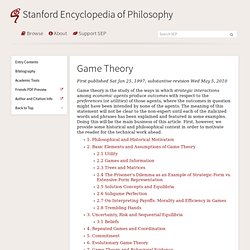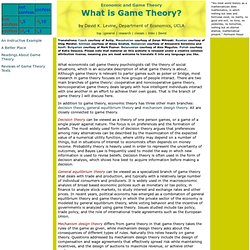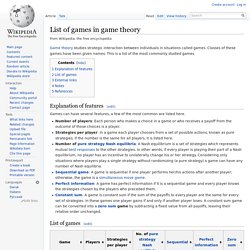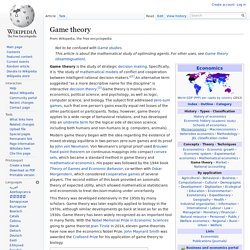

Game Theory. First published Sat Jan 25, 1997; substantive revision Wed May 5, 2010 Game theory is the study of the ways in which strategic interactions among economic agents produce outcomes with respect to the preferences (or utilities) of those agents, where the outcomes in question might have been intended by none of the agents.

The meaning of this statement will not be clear to the non-expert until each of the italicized words and phrases has been explained and featured in some examples. Doing this will be the main business of this article. First, however, we provide some historical and philosophical context in order to motivate the reader for the technical work ahead. 1. The mathematical theory of games was invented by John von Neumann and Oskar Morgenstern (1944). Despite the fact that game theory has been rendered mathematically and logically systematic only since 1944, game-theoretic insights can be found among commentators going back to ancient times. What is Game Theory? Translations: Czech courtesy of Autip.

Macedonian courtesy of Zoran Mitreski. Russian courtesy of Oleg Meister. German courtesy of Alexy Gnatuk. Romanian courtesy of Alexandra Seremina and Azoft. Bulgarian courtesy of Mark Pozner. What economists call game theory psychologists call the theory of social situations, which is an accurate description of what game theory is about. In addition to game theory, economic theory has three other main branches: decision theory, general equilibrium theory and mechanism design theory. Decision theory can be viewed as a theory of one person games, or a game of a single player against nature. General equilibrium theory can be viewed as a specialized branch of game theory that deals with trade and production, and typically with a relatively large number of individual consumers and producers. An Instructive Example Note that higher numbers are better (more utility). CS 8803 - Game Theory and Computer Science. Spring 2008 - Theory.
John von Neumann and the ENIAC Info Time: Tuesdays and Thursdays 9:35-10:55am Location: College of Computing, room 53 Instructor: Adam Tauman Kalai Grading: 50% Homework (Students may work alone or in groups of size at most 3.

References: Some of the material for the class will be taken from the following books, but they are not required. Algorithmic Game Theory, edited by Nisan et al. Adam's Office hours: Thursday after class. TA: Atish Das Sarma, [Email: atish@cc.gatech.edu]. Lecture notes Assignments GTCS Assignment 1 Due 1/31/08. List of games in game theory. Game theory studies strategic interaction between individuals in situations called games.

Classes of these games have been given names. This is a list of the most commonly studied games Explanation of features[edit] Games can have several features, a few of the most common are listed here. Number of players: Each person who makes a choice in a game or who receives a payoff from the outcome of those choices is a player.Strategies per player: In a game each player chooses from a set of possible actions, known as pure strategies.
List of games[edit] External links[edit] Notes[edit] Jump up ^ For the cake cutting problem, there is a simple solution if the object to be divided is homogenous; one person cuts, the other chooses who gets which piece (continued for each player). References[edit] David Levine's Economic and Game Theory Page. Chronology of Game Theory. Game Theory .net - Resources for Learning and Teaching Strategy for Business and Life. Game theory. Game theory is the study of strategic decision making.

Specifically, it is "the study of mathematical models of conflict and cooperation between intelligent rational decision-makers. "[1] An alternative term suggested "as a more descriptive name for the discipline" is interactive decision theory.[2] Game theory is mainly used in economics, political science, and psychology, as well as logic, computer science, and biology. The subject first addressed zero-sum games, such that one person's gains exactly equal net losses of the other participant or participants.
Today, however, game theory applies to a wide range of behavioral relations, and has developed into an umbrella term for the logical side of decision science, including both humans and non-humans (e.g. computers, animals). Modern game theory began with the idea regarding the existence of mixed-strategy equilibria in two-person zero-sum games and its proof by John von Neumann. Yale Video Course.